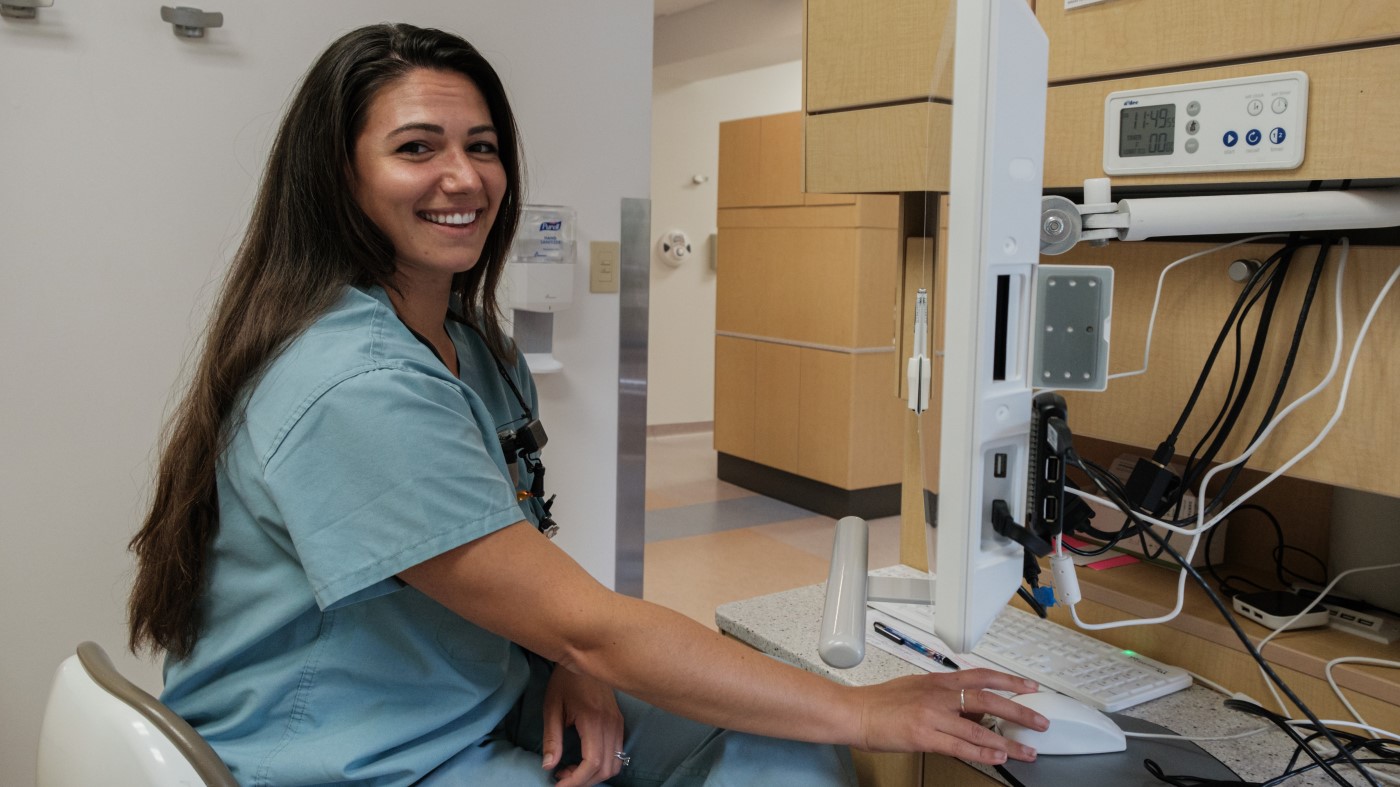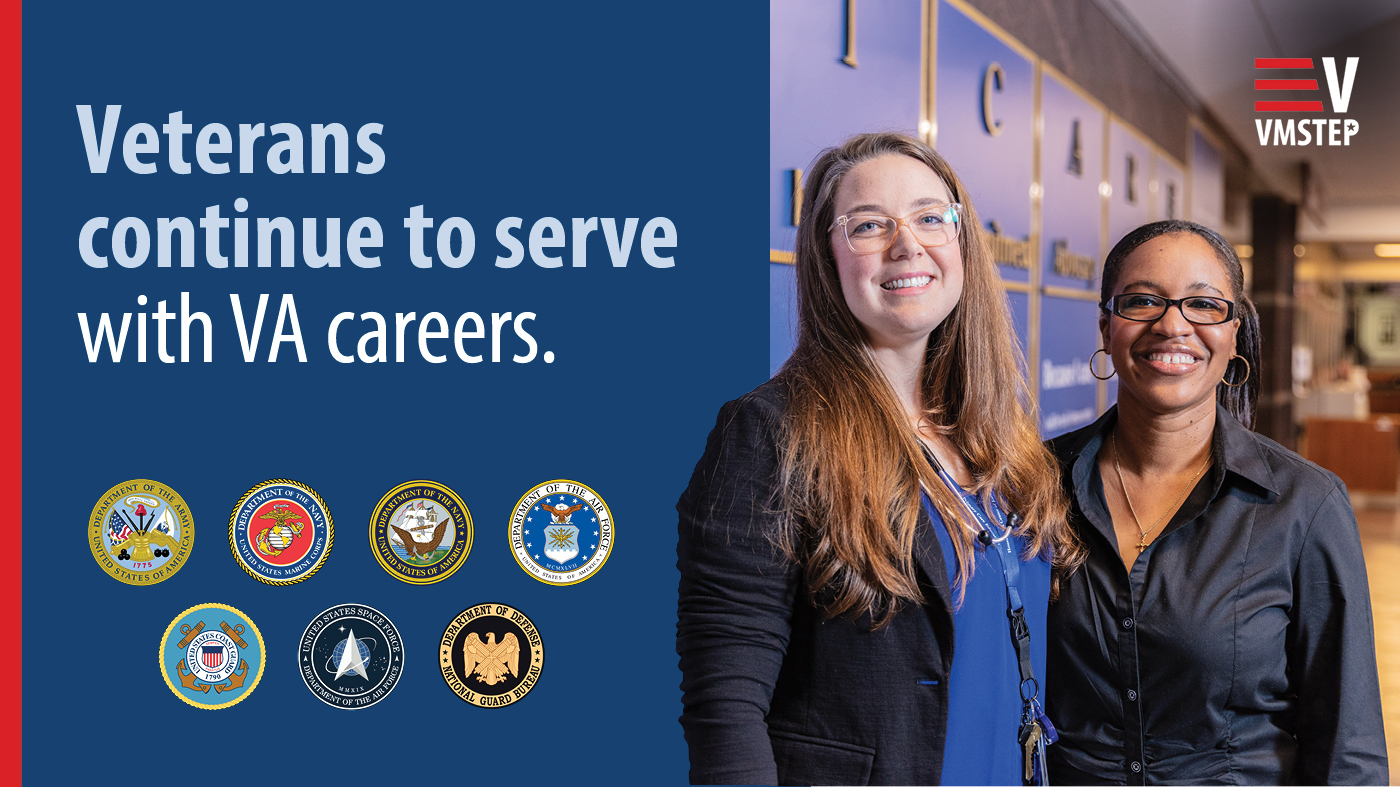New nursing school graduate RNs with less than a year of professional experience are eligible to apply for VA’s RNTTP Residency Program – but why should they? Hear from recent graduate Elizabeth Lee, assistant nurse manager of the Community Living Center (CLC) at Ralph H. Johnson VA Medical Center in Charleston, SC, on her fulfilling experience, current role, and why she is proud of the program.
This 12-month training program helps recent nursing school graduates transition from novice to advanced beginner to competent professional RN.
Qualified preceptors will guide you as you take on the role, duties, patient care activities and procedures RNs perform. Throughout the program, you’ll benefit from:
- Hands-on clinical experiences
- Classroom and simulation training
- Preceptorship
- Mentorship
- Shadowing experiences
Learn from Elizabeth Lee, an RNTTP graduate
Q: How did you hear about the RNTTP program?
I was a Licensed Practical Nurse (LPN) working at the community-based outpatient clinic (CBOC) in Goose Creek, a primary care clinic at the Ralph H. Johnson VA Medical Center, when my nurse manager told me about the Transition-to-Practice program. She thought that I would be a great candidate and a good fit. My manager then reached out to Dr. Webb, the RNTTP program coordinator to obtain information for my consideration. Dr. Webb not only sent me the program information but kept in contact with me throughout my journey from LPN to RN. Her constant encouragement and support were one of the reasons I applied once I obtained my RN license.
Q: Why did you decide to apply to the program?
I was taking a preceptor training course at the main facility and met some nurses in the RNTTP and PBNR program. I asked them questions about their experience in the program and if would they recommend it to other new RNs. They talked about the support they received throughout the program and that the nurse educators were dedicated to their success, which sparked my interest to apply. I had been accepted into another residency program but decided to go with the VA program based solely upon those comments. Being set up for success and having the support I needed to succeed was important to me as I transitioned into a professional nurse. In addition to that, prior to starting the program, Dr. Webb remained in contact with me and reached out every so often to check on my progress and help, in stark contrast to the other program that had not contacted me at all.
Q: How was your experience during the 12-month program? Do you have any stand-out memories, experiences, projects, relationships, etc. from your time in the program?
Overall, I had a great experience in the program. We were the first COVID cohort, therefore we formed a special bond as we were new nurses in this program during a worldwide healthcare frenzy. A lot of things were met with uncertainty, and we had to quickly adapt and change almost daily. We are all still in contact with each other and consider ourselves trailblazers because our cohort laid the blueprint for future cohorts. I currently supervise one of the nurses from my cohort, so we have a bird’s eye view of each other’s journey.
One of the stand-out volunteer projects my cohort participated in was working with the local Father to Father organization, which offers education and services tailored for fathers trying to rebuild their lives and their families. We also served Thanksgiving meals to some of the homeless population and other displaced people in the Charleston area. My cohort voted to continue with this outreach project, despite the COVID risk, because it was an important mission that we wanted to be a part of. Going in, we were all a little nervous, but we masked up and got out there. Once we connected with the people in the community and saw the impact we had, we knew we made the right decision despite the added risk. To me, this is what nursing is all about.
I was also able to complete a process improvement project to improve communication between nurses and physicians and implement it on my unit. I got to see it from inception to the end, and it’s still in practice in some form today. It’s a project that I was able to carry over and pilot on my current unit, where I’m assistant nurse manager. If the pilot is successful, I will present it to my nurse manager (NM) to implement on our unit.
Q: What would you like other nursing school graduates to know about the program?
First, being a new nurse is hard, so having a residency program like the RNTTP program bridges the gap between school and real-world experience. This program provides you the support needed so you don’t feel like you’re thrown in without a lifesaver. In nursing school we’ve all heard that “nurses eat their young.” This program debunks that myth, and the nurse educators aim to instill the confidence in new nurses that is required to grow from novice to expert. It provides a safe space to ask those “never dumb” questions, cultivate your critical thinking skills and make those mistakes in a culture-like environment.
In addition, you are given ample resources that set you up for success and beyond. There is no way you can learn everything in 12 months. I still look to my former educators for guidance and assistance with navigating the complexities of VA and for answers to questions I may have in my daily practice.
Q: Do you have any ties to the military?
Yes, I come from a large family of service members, including brothers, uncles and my grandfather was a Buffalo Soldier. When I was young, I was there when General Colin L. Powell initiated the statue at Fort Leavenworth. However, I didn’t know what that all meant and that my grandfather was an integral part of military history. In addition, my father served 27 years in the Army, and my spouse is retired from the Navy. I come from a very patriotic, Veteran-centric family. VA and any program involved in promoting the well-being of Veterans is very near and dear to my heart.
Q: What are the next steps in your nursing career?
I’m very fortunate to work under a leadership team that is devoted to the care of our Veterans and unit. My plans are to absorb as much knowledge as I can and take advantage of all training opportunities to grow my nursing career.
At some point soon, I plan on returning to school to complete my Doctor of Nursing Practice (DNP). However, right now I am committed to doing my best in my new role as assistant nurse manager. I often serve as an unofficial mentor, so I would like to parlay that into a real role here at the Ralph H. Johnson. Mentoring is especially important for brand new nurses because navigating the government system can be overwhelming at times.
Q: Is there anything else you would like to say about the program?
This program is structured for success. Part of my success is attributed to being encouraged by the educators to ask questions and to keep asking questions. Also, I wasn’t afraid to own my mistakes or step into a challenge, which has helped me in the VA environment.
Research shows that programs like this categorically set new nurses up for success. I completed my Master of Science in Nursing (MSN) the same month I graduated from the RNTTP program. The following month, I was selected as the ANM on the CLC. I credit this program and the nurse educators with providing me the tools to strengthen my skills and increase my self-assurance. It has helped me to foster relationships throughout the facility to position myself for a successful nursing career at VA.
Build a nursing career at VA
Kim DeMasi, program manager of the RNTTP Residency Program, echoes Lee’s pride for the program and that it provides new nurses with the tools they need to build a successful nursing career.
“I can think of no greater mission as a nurse educator than supporting our newest nurses as they transition from their academic program to clinical practice; the RNTTP Residency Program is the structured support for success!” DeMasi said.
Apply today for the RNTTP program to kickstart your nursing career. With access to cutting-edge technology and state-of-the-art tools, you’ll discover a challenging yet rewarding position. Most importantly, through building your nursing career at VA, you will be directly impacting the lives of our nation’s Veterans.
- LEARN what VA has to offer Nurse applicants
- EXPLORE how your nursing education adds to your qualifications
- READ about VA’s RNTTP Residency Program
- APPLY for the RNTTP Residency Program
NOTE: Positions listed in this post were open at the time of publication. All current available positions are listed at USAJobs.gov.
Topics in this story
More Stories
You had questions, we had answers. Take a look at the information and advice we shared that had the most impact with readers in 2024.
For Veterans, the mission does not end when the uniform comes off. VA careers offer opportunities to serve while building fulfilling civilian careers.
Whether it’s access to the great outdoors or a calmer pace in your everyday life, you can find it in rural VA communities around the country.






